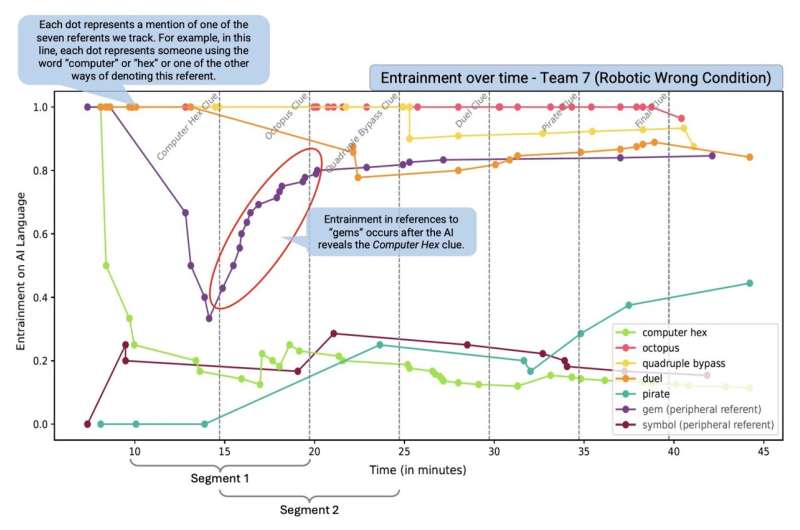August 14, 2024 feature
This article has been reviewed according to Science X's editorial process and policies. Editors have highlighted the following attributes while ensuring the content's credibility:
fact-checked
preprint
trusted source
proofread
How working with AI impacts the collective attention of teams

The effectiveness of teamwork in professional and academic environments typically depends on various factors, including communication and coordinated attention. In this context, collective attention entails the ability of team members to cooperatively focus on the task at hand, optimally dividing it into subtasks and alternating their efforts to complete it as efficiently as possible.
Researchers at Northeastern University recently carried out a study exploring whether the introduction of artificial intelligence (AI)-based virtual assistants within a team of humans influences the team's collective attention. Their findings, pre-published on arXiv, suggest that the use of AI-based tools in a collaborating group can significantly influence what is discussed by team-members and how it is discussed.
"AI is going to play an increasingly large role in how we are going to work in the future," Christoph Riedl, co-author of the paper, told Tech Xplore. "Research has been investigating dyads of one human working with one AI system for a while. Yet less research has looked at how entire teams will work with an AI system."
The key objective of the recent study by Riedl and his colleagues was to gain a better understanding of how the presence of AI assistance would impact teamwork. Instead of focusing only on the dynamics between the AI and individual humans, however, they looked at the AI's influence on dynamics between all members of the team, including human-human dynamics.
"We ran a lab experiment in which groups of 3–4 humans had to solve a difficult puzzle task," Riedl said. "To help them, they got access to an AI assistant. Over the course of the experiment, the AI assistant gave the team several clues on how to solve the puzzle. We recorded the communication of the team and looked for changes in the team's communication pattern right before the AI assistant dispensed the clue and right after."
To investigate whether a team's communication was affected by the presence of an AI agent, the researchers carefully transcribed all the recorded conversations among team-members. They also noted what the general topic of discussion was at different times and what specific words were used.
"We found two interesting things," Riedl explained. "First, teams were strongly influenced in what they talked about by the AI assistant. Once the AI assistant introduced a new idea, humans immediately jumped on it and talked about that new idea, even if it was a low-quality clue that didn't help them solve the puzzle. Second, we observed that the humans on the teams adopted the language used by the AI assistant."
The experiments carried out by Riedl and his colleagues suggest that when used during group-work, AI assistants can influence both what is discussed by human team-members and the specific terminology used. For instance, the researchers found that as they were solving the puzzle used in their experiments, members of some teams initially referred to a specific symbol as "diamond," yet they started calling it "gem" after the AI assistant had done so.
Interestingly, this language adaptation process appears to be automatic and occurs irrespective of how the participants feel about the AI assistant. For instance, some teams started using the same language as the AI even if they reported not trusting it and doubting its competence.
"I think the most notable implications of these findings are that when one introduces AI systems there can be all kinds of unintended consequences," Riedl said.
"In our case, the AI system was designed to improve team performance via the clues that it dispensed, but beyond that intended goal, the system subtly shifted teams' collective attention and the language teams used. Some of those impacts can have positive effects—like improved cognitive alignment among the human team members—but others may have negative effects—like shifting attention away from the most task relevant aspects."
The recent work by this team of researchers highlights the complex ripple effects that can occur when introducing AI systems in professional and collaborative environments. While anticipating all the ways in which AI will impact the people they interact with is a highly difficult, if not unattainable, goal, Riedl and his colleagues plan to continue investigating the effects of these systems in various settings.
"Our research shows that adopting a collective intelligence lens and building on existing collective intelligence research can give AI researchers an important baseline understanding of group dynamics," Riedl added.
"Overall, this suggests that designing helpful AI systems may be much harder than we thought because now designers need to pay attention to how their system may affect other aspects of team dynamics. Currently, my lab is working on related research on unintended consequences of AI. How does AI affect outcomes beyond 'performance' such as attention, learning, and organizational culture."
More information: Josie Zvelebilova et al, Collective Attention in Human-AI Teams, arXiv (2024). DOI: 10.48550/arxiv.2407.17489
© 2024 Science X Network


















